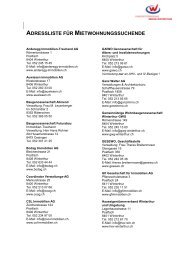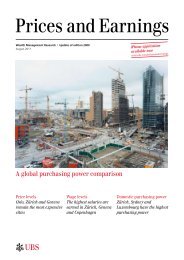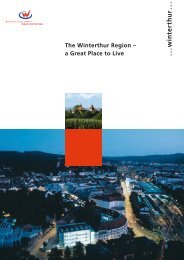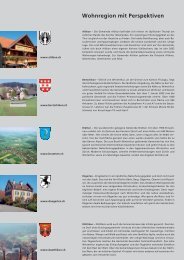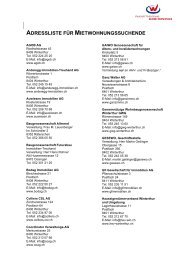Handbook for Investors. Business location in Switzerland.
Handbook for Investors. Business location in Switzerland.
Handbook for Investors. Business location in Switzerland.
You also want an ePaper? Increase the reach of your titles
YUMPU automatically turns print PDFs into web optimized ePapers that Google loves.
10.3.3 Expatriates<br />
Qualify<strong>in</strong>g expatriates are <strong>for</strong>eign managers and certa<strong>in</strong> specialists<br />
(e.g., IT specialists) seconded to <strong>Switzerland</strong> on a temporary<br />
basis <strong>for</strong> a period of up to five years, i.e., the (assignment)<br />
contract has to be limited <strong>in</strong> time <strong>for</strong> a maximum of five years.<br />
Expatriates may claim tax relief on expenses <strong>in</strong>curred due to their<br />
stay <strong>in</strong> <strong>Switzerland</strong>.<br />
The follow<strong>in</strong>g expenses <strong>in</strong>curred by expatriates are deductible:<br />
i) re<strong>location</strong> costs <strong>in</strong>clud<strong>in</strong>g travel costs to and from <strong>Switzerland</strong>,<br />
ii) reasonable accommodation costs <strong>in</strong> <strong>Switzerland</strong> while still<br />
ma<strong>in</strong>ta<strong>in</strong><strong>in</strong>g a residence abroad, iii) costs <strong>for</strong> school-age children<br />
attend<strong>in</strong>g a private school if local state-funded schools cannot<br />
offer adequate educational provisions. Instead of identify<strong>in</strong>g the<br />
actual costs <strong>for</strong> re<strong>location</strong> and accommodation, the taxpayer<br />
may claim a monthly lump-sum deduction which may vary from<br />
canton to canton. Any reimbursement of work-related costs of the<br />
expatriate by the employer must be declared <strong>in</strong> the employee’s<br />
salary slip.<br />
The entitlement to benefit from the expatriates’ status <strong>for</strong> tax<br />
purposes ceases once temporary employment is replaced or<br />
superseded by a permanent position.<br />
10.3.4 Cross-border commuters<br />
Cross-border commuters are those people who live abroad<br />
(e.g., <strong>in</strong> Austria, France, Germany, Italy or Liechtenste<strong>in</strong>) and work<br />
<strong>in</strong> <strong>Switzerland</strong>, commut<strong>in</strong>g from home to work and back each<br />
day.<br />
The Swiss taxation of such <strong>in</strong>dividuals differs, depend<strong>in</strong>g on their<br />
place of work and domicile (home or <strong>for</strong>eign country). The double<br />
tax treaty with Germany, <strong>for</strong> example, provides <strong>for</strong> an apportionment<br />
of the taxation right between the two countries. The country<br />
of work is limited to a flat rate withhold<strong>in</strong>g tax of 4.5 % of the<br />
gross salary of the cross-border commuter. Such partial taxation<br />
of cross-border commuters <strong>in</strong> the country of work does not<br />
relieve the commuter from taxation of the earned <strong>in</strong>come at the<br />
place of residence (e.g., taxation with credit). The cross-border<br />
commuter status is abandoned if the employee does not return to<br />
his domicile abroad on more than 60 work<strong>in</strong>g days per year.<br />
10.3.5 Lump-sum taxation<br />
Both federal and cantonal tax legislation provides <strong>for</strong> the option of<br />
a special tax arrangement often referred to as lump-sum taxation,<br />
whereby qualify<strong>in</strong>g Swiss resident taxpayers are taxed on the<br />
basis of expenditures and cost of liv<strong>in</strong>g <strong>in</strong> <strong>Switzerland</strong> <strong>in</strong>stead of<br />
the usual worldwide <strong>in</strong>come and assets.<br />
Qualify<strong>in</strong>g taxpayers who may apply <strong>for</strong> lump-sum taxation are<br />
<strong>in</strong>dividuals who take up temporary or permanent residence <strong>in</strong><br />
<strong>Switzerland</strong> <strong>for</strong> the first time or after an absence of at least ten<br />
years and who do not carry out any ga<strong>in</strong>ful occupation <strong>in</strong> <strong>Switzerland</strong>.<br />
While Swiss nationals may only apply <strong>for</strong> this arrangement<br />
<strong>in</strong> the tax period of tak<strong>in</strong>g up residency, <strong>for</strong>eigners are allowed to<br />
apply <strong>for</strong> an <strong>in</strong>def<strong>in</strong>ite period, provided that the conditions are fulfilled.<br />
The lump-sum taxation provisions are tailored to f<strong>in</strong>ancially<br />
<strong>in</strong>dependent persons who are not seek<strong>in</strong>g to work <strong>in</strong> <strong>Switzerland</strong>.<br />
In the case of spouses mov<strong>in</strong>g to <strong>Switzerland</strong>, the provisions<br />
<strong>for</strong> benefit<strong>in</strong>g from lump-sum taxation must be fulfilled by both<br />
spouses. As a rule, it is not possible <strong>for</strong> one spouse to be taxed<br />
under lump-sum taxation while the other spouse is taxed under the<br />
regular system.<br />
The basis of taxation is calculated annually on expenses <strong>in</strong>curred<br />
by the taxpayer <strong>in</strong> <strong>Switzerland</strong> and abroad. The calculation does<br />
not only consider the expenses of the taxpayer but also those of<br />
the spouse and dependent children as long as they live <strong>in</strong> <strong>Switzerland</strong>.<br />
Expenses usually taken <strong>in</strong>to account are food, cloth<strong>in</strong>g<br />
and accommodation, education, leisure activities and all other<br />
expenses l<strong>in</strong>ked with the standard of liv<strong>in</strong>g. The exact calculation<br />
is determ<strong>in</strong>ed together with the relevant tax authorities of the<br />
canton <strong>in</strong> which the person wishes to become a resident. In each<br />
case, the m<strong>in</strong>imum base must correspond either to a) at least five<br />
times the rent paid on rental property or five times the imputed<br />
<strong>in</strong>come attributable to homeowners or b) two times the annual<br />
costs of lodg<strong>in</strong>g if the taxpayer lives <strong>in</strong> a hotel or similar accommodation.<br />
If the taxpayer owns or rents more than one property,<br />
the most expensive will be taken <strong>in</strong>to account.<br />
Generally, <strong>in</strong>dividuals who apply <strong>for</strong> lump-sum taxation are considered<br />
Swiss residents and may also apply <strong>for</strong> treaty relief on<br />
their <strong>for</strong>eign-source <strong>in</strong>come. Some treaties however allow only <strong>for</strong><br />
treaty benefits if all <strong>in</strong>come from the source country is subject to<br />
ord<strong>in</strong>ary taxation <strong>in</strong> <strong>Switzerland</strong>.<br />
<strong>Handbook</strong> <strong>for</strong> <strong>Investors</strong> 2010<br />
95




